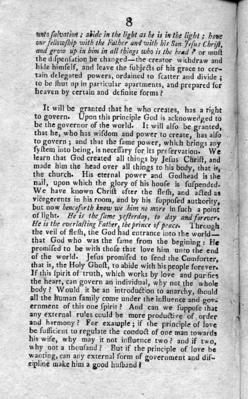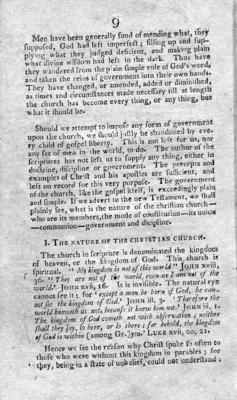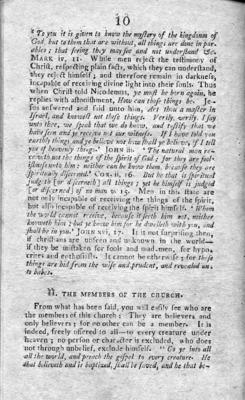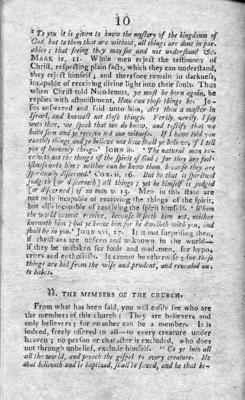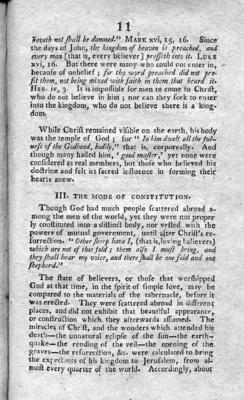Pages
Page 6
8
unto salvation ; abide in the light as he is in the light ; have our fellowship with the Father and with his Son Jesus Christ, and grow up in him in all things who is the head ? or must the dispensation be changed - the creator withdraw and hide himself , and leave the subjects of his grace to certain delegated powers, ordained to scatter and divide ; to be shut up in particular apartments, and prepared for heaven by certain and definite forms ?
It will be granted that he who creates, has a right to govern. Upon this principle God is acknowedged to be the governor of the world. It will also be granted, that be, who has wisdom and power to create, has also to govern ; and that the same power, which brings any system into being, is necessary for its preservation. We learn that God created all things by Jesus Christ, and made him the head over all things to his body, that is the church. His eternal power and Godhead is the nail, upon which the glory of his house is suspended. We have know Christ after the flesh, and acted as vicegerents in his room, and by his supposed authority, but now henceforth know we him no more in such a point of light. He is the same yesterday, to day and forever. He is the everlasting Father, the prince of peace. Through the veil of flesh, the God had entrance into the world -- that God who was the same from the begining : He promised to be with those that love him unto the end of the world. Jesus promised to send the Comforter, that is, the Holy Ghost, to abide with his people forever. If this spirit of truth, which works by love and purifies the heart, can govern an individual, why not the whole body ? Would it be an introduction to anarchy, should all the human family come under the influence and government of this one spirit ? And can we suppose that any external rules could be more productive of order and harmony ? For example ; if the principle of love be sufficient to regulate the conduct of one man towards his wife, why may it not influence two ? and if two, why not a thousand ? But if the principle of love be wanting, can any external form of government and dis cipline make him a good husband ?
Page 7
9 Men have been generally fond of mending what, they supposed, God had left imperfect ; filling up and supplying what they judged deficient, and making plain what divine wisdom had left in the dark. Thus have they wanderes from the plain simple rule of God's word, and taken the reins of government into their own hands. They have changed, or amended, added or diminished, as times and circumstances made necessary till at length the church has become every thing, or any thing, but what it should be.
Should we attempt to impose any form of government upon the church, we should justly be abandoned by every child of gospel liberty. This is not left for us, nor any set of men in the world, to do. The author of the scriptures has not left us to supply any thing, either in doctrine, discipline or government. The precepts and examples of Christ and his apostles are sufficient, and left on record for this very purpose. The government of the church, like the gospel itself, is exceedingly plain and simple. If we advert to the new Testament, we shall plainly see, what is the nature of the christian church - who are its members, the mode of constitution -- its union -- communion -- government and dicipline.
I. THE NATURE OF THE CHRISTIAN CHURCH.
The church in scripture is denmminated the kingdom of heaven, or the kingdom of God. This church is spiritual. " My kingdom is not of this world" JOHN xviii, 36. "They are not of the world even as I am not of the world." JOHN xvii, 16. It is invisible. The natural eye cannot see it ; for ' except a man be born of God, he cannot see the kingdom of God.' JOHN iii, 3. 'Therefore the world knoweth us not, because it knew him not.' JOHN iii, I. The kingdom of God cometh not with observation ; neither shall they say, lo here, or lo there ; for behold, the kingdom of God is within [among Gr,] you.' LUKE xvii, 20, 21.
Hence we see the resson why Christ spoke so often to those who were without this kingdom in parables ; for they being in a state of unbelief, could not understand ;
Page 8
10
'To you it is given to know themystery of the kingdom of God, but to them that are without, all things are done in parables ; that seeing thay may see and not understand &c. MARK iv. II. While men reject the testimony of Christ, respecting plain facts, which they can understand. they reject himself ; and therefore remain in darkness, incapable of receiving divine light into their souls. Thus when Christ told Nicodemus, ye must be born again, he replies with astonishment, How can these things be. Jesus answered and said unto him, Art thou a master in Israel, and knowest not these things. Verily, verily, I say unto thee, we speak that we do know, and testify that we have seen and ye receive not our withness. If I have told you earthly things and ye believe not how shall ye believe, if I tell you of beavenly things.' JOHN iii. ' The natural man receiveth not the things of the spirit of God ; for they are foolishness unto him : neither can be know them because they are spiritually discerned.' COR. ii, 16. But he that is spiritual judgeth [ or discerneth] all things ; yet he himself is judged [ or discerned ] of no man v. 15. Men in this state are not only incapable of receiving the things of the spirit, but also incapable of receiving the spirit himself. 'Whom the world cannot receive, because it seeth him not, neither knoweth him ; but ye know him for he dwellwth with you, and shall be in you.' JOHN xvi, 17. It is not surprising then, if christians are unseen and unknown in the world -- if they be mistaken for fools and mad-men, for hypocrites and enthusiasts. It cannot be otherwise ; for these things are hid from the wise and prudent, and revealed unto nabes.
II. THE MEMBERS OF THE CHURCH.
From what has been said, you will easily see who are the members of this church : They are believers and only believers ; for no other can be a member. It is indeed, freely offered to all - to every creature under heaven ; no person or character is excluded, who does not through unbelief, exclude himself. " Go ye into all all the world, and preach the gospel to every creature. He that believeth and is baptized, shall be saved, and he that be-
Page 9
10
'To you it is given to know themystery of the kingdom of God, but to them that are without, all things are done in parables ; that seeing thay may see and not understand &c. MARK iv. II. While men reject the testimony of Christ, respecting plain facts, which they can understand. they reject himself ; and therefore remain in darkness, incapable of receiving divine light into their souls. Thus when Christ told Nicodemus, ye must be born again, he replies with astonishment, How can these things be. Jesus answered and said unto him, Art thou a master in Israel, and knowest not these things. Verily, verily, I say unto thee, we speak that we do know, and testify that we have seen and ye receive not our withness. If I have told you earthly things and ye believe not how shall ye believe, if I tell you of beavenly things.' JOHN iii. ' The natural man receiveth not the things of the spirit of God ; for they are foolishness unto him : neither can be know them because they are spiritually discerned.' COR. ii, 16. But he that is spiritual judgeth [ or discerneth] all things ; yet he himself is judged [ or discerned ] of no man v. 15. Men in this state are not only incapable of receiving the things of the spirit, but also incapable of receiving the spirit himself. 'Whom the world cannot receive, because it seeth him not, neither knoweth him ; but ye know him for he dwellwth with you, and shall be in you.' JOHN xvi, 17. It is not surprising then, if christians are unseen and unknown in the world -- if they be mistaken for fools and mad-men, for hypocrites and enthusiasts. It cannot be otherwise ; for these things are hid from the wise and prudent, and revealed unto nabes.
II. THE MEMBERS OF THE CHURCH.
From what has been said, you will easily see who are the members of this church : They are believers and only believers ; for no other can be a member. It is indeed, freely offered to all - to every creature under heaven ; no person or character is excluded, who does not through unbelief, exclude himself. " Go ye into all all the world, and preach the gospel to every creature. He that believeth and is baptized, shall be saved, and he that be-
Page 10
11
lieveth not shall be demned." MARK xvi, 15, 16. Since the days of John, the kingdom of heaven is preached, and every man [ that is, every believer] presseth into it. LUKE xvi, 16. But there were many who could not enter in, because of unbelief ; for the word preached did not profit them, not being mixed with faith in them that heard it. HEB. iv, 3. It is impossible for men to come to Christ, who do not believe in him; nor can they seek to enter into the kingdom, who do not believe there is a kingdom.
While Christ remained visible on the earth, his body was the temple of God; for " In him dwelt all the fulness of the Godhead, bodily," that is, corporeally. And though many hailed him, ' good master,' yet none were considered as real members, but those who believed his doctrine and felt its sacred influence in forming their hearts anew.
III. THE MODE OF CONSTITUTION.
Though God had much people scattered abroad among the men of the world, yet they were not proper ly constituted into a distinct body, nor vested with the powers of mutual government, until after Christ's resurrection. "Other sheep have I, (that is, loving believers) which are not of this fold ; them also I must bring, and they shall hear my voice, and there shall be one fold and one shepherd."
That state of believers, or those that worshipped God at that time, in the spirit of simple love, may be compared to the materials of the tabernacle, before it was erected. They were scattered abroad in different places, and did not exhibit that beautiful appearance or construction which they afterwards assumed. The miracles of Christ, and the wonders which attended his death -- the unnatural eclipse of the sun -- the earthquake -- the rending of the veil -- the opening of the graves -- the resurrection, &c. were calculated to bring the expectants of his kingdom to Jerusalem, from almost every quarter of the world. Accordingly, about
